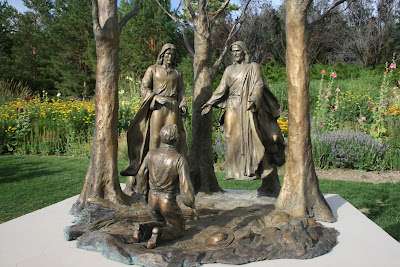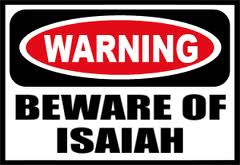In 2 Nephi 16 (compare Isaiah 6) Isaiah records a vision he had of the throne of God. As far as the Isaiah chapters go, this is one of my personal favorites. This is mostly because it's a cool, visual story, with angels and hot coals and stuff. According to verse 1 where it says that this happened the same year that King Uzziah died, Isaiah saw this vision around the year 740 B.C.
What I really like about this chapter is its depiction of repentance and forgiveness. If you'd like to read it for yourself, it ain't very long. I'll probably only quote
I identify with Isaiah's feeling of unworthiness, and his declaration that he is not clean enough to be in The Lord's presence. I'm pretty sure I've done far more dumb stuff than Isaiah ever did. He probably did his Home Teaching every month.
So, here we go...
2 Nephi 16: 1-7
1. In the year that king Uzziah died, I saw also The Lord sitting upon a throne, high and lifted up, and his train filled the temple.
2. Above it stood the seraphim; each one had six wings; with twain he covered his face, and with twain he covered his feet, and with twain he did fly.
3. And one cried unto another, and said: Holy, holy, holy, is The Lord of Hosts; the whole earth is full of His glory.
4. And the posts of the door moved at the voice of him that cried, and the house was filled with smoke.
5. Then said I: Wo is unto me! for I am undone; because I am a man of unclean lips; and I dwell in the midst of people of unclean lips; for mine eyes have seen The King, The Lord of Hosts.
6. Then flew one of the seraphim unto me, having a live coal in his hand, which he had taken with the tongs from off the altar;
7. And he laid it upon my mouth, and said: Lo, this has touched thy lips; and thine iniquity is taken away, and thy sin purged.
8. Also I heard the voice of The Lord, saying: Whom shall I send, and who will go for us? Then I said: Here am I; send me.
9. And He said: Go and tell this people -Hear ye indeed, but they understood not; and see ye indeed, but they perceived not.
Now, I don't much care for spicy foods. I don't dig the unquenchable fire in my mouth, nor the heartburn soon after. But I can't imagine eating a hot coal...
This being more metaphorical than literal, I'll try to get back on the subject...
So, here we have God calling for a messenger to teach Israel that they're not getting it. Isaiah has the desire, but doesn't feel worthy. He declares to The Lord that he has unclean lips. The Lord's angel takes a hot coal off of the altar with tongs and places it on Isaiah's lips to purge his sin and make him clean. Let's talk about some general steps of repentance...
Repentance: Acknowledge your mistake, and that it was a sin.
Repentance: Feel sorrow for your sin.
Repentance: Be humble, sincere and contrite.
Repentance: Ask for forgiveness
Repentance: Make the changes necessary.
"A live coal, which he had taken with tongs from off the altar."
I need to go back and interject something here, even though I sent this post to the presses days ago. I forgot to mention something about the altar in Isaiah's vision. In The Church's temples there are altars. These altars signify the covenants that we make in the temple. A covenant is a binding promise between ourselves and our Heavenly Father. An example of one such covenant is obedience. We promise to be obedient to The Lord's commandments. A covenant is a two-way promise. For His part, The Lord promises us blessings in return for our obedience. We may fail to keep our part of the covenant, but He will never, no never, no never forsake His end of the deal. Part of repentance is turning away from whatever sin it is, and making a covenant to not repeat that sin. Many's the time that I have had to repeat that same repentance process over the same dumb thing, over and over. One of the greatest, most wonderfullest things about our Heavenly Father and His Son, Jesus Christ, is that their capacity for love and forgiveness has no end. The apostle Paul experienced this first hand when he had to repent of some very serious sins. He was forgiven. Then Paul says to the Ephesians:
Ephesians 3: 14-19
14. For this cause I bow my knees unto the Father of our Lord Jesus Christ,15. Of whom the whole family in heaven and earth is named.16. That He would grant you, according to the riches of His glory, to be strengthened with might by His Spirit in the inner man.17. That Christ may dwell in your hearts by faith; that ye, being rooted and grounded in love,18. May be able to comprehend with all saints what is the breadth, and length, and depth, and height;19. And to know the love of Christ, which passeth knowledge, that ye might be filled with all the fulness of God.
Repentance: Have faith in Jesus Christ.
Even to Paul, the love of Christ "passeth
knowledge", or is beyond his ability to comprehend. Keep that in mind
if you keep making the same mistakes over and over, like I have, and try
not to beat yourself up too bad. Just keep swimming.
Repentance: If you make another mistake...
At least, that's the lesson I get out of this chapter. There is another mention, of course, of the scattering of Israel and how a "remnant shall return". My guess is, we'll hear that a few more times before 2 Ne 25.
One more thing...
Angels are nearly always depicted in art and literature as having wings. Chapters like this are the reason for that, I suppose. The Church teaches things differently. Angels are either spirits who are living in God's presence waiting their turn to be born, or spirits who have already gone through mortality and have returned to His presence, or resurrected beings who have already gone through mortality. Having
The scriptures tell us that we can come and buy milk and honey without price, but the forgiveness that comes from true repentance cost our Savior dearly. I love that an angel was sent to comfort Jesus in Gethsemane in answer to His prayer. I think that Carl Bloch failed to realize that even this angel depended on The Savior for his salvation.
Peace be with you...


























































